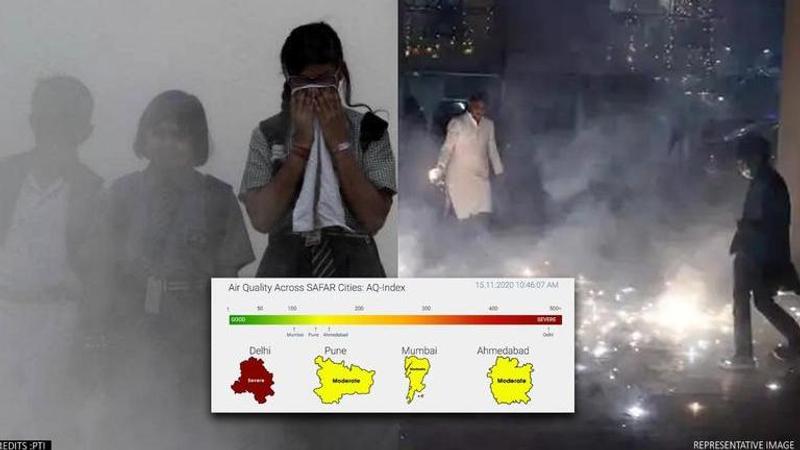Published 13:27 IST, November 15th 2020
Air Pollution: Here's a comparison of AQI after Diwali; Delhi remains worst-hit
While the capital continues to reel under hazardous pollution levels, let's take into perspective the AQI of the other leading cities.

The government in most states of India had announced a ban on the sale of firecrackers in order to curb the menace of pollution. However, the air quality in the national capital deteriorated to the “severe” category, a day after Diwali on Sunday as people flouted the restrictions of fire crackers.
Doctors and scientists have already warned that short-term exposures to high levels of PM 2.5 can cause severe health problems that include worsening of coronavirus infections. Owing to a combination of stubble burning and firecrackers, the air quality dipped to "severe" at several places on Saturday night itself.
An AQI between 0-50 is considered 'good', 51-100 'satisfactory', 101-200 'moderate', 201-300 'poor', 301-400 'very poor' and 401-500 'severe'. An AQI above 500 falls in the 'severe plus' category.
While the capital continues to reel under hazardous pollution levels, let's take into perspective the AQI of the other leading cities. The ban on firecrackers in 13 Uttar Pradesh cities proved ineffective as people continued to burst crackers with a vengeance on Diwali night. The air quality index in Lucknow plunged to 881 by midnight and settled at 427 on Sunday morning.
Meanwhile, Mumbai and Kolkata's AQI remained in the 'moderate' category with the AQI of 159 and 164 respectively. However, Ahemadabad's plunged to 243, falling into the 'poor' category. Ahemadabad's AQI was earlier 150.
Meanwhile, the neighbouring cities in Delhi - Faridabad (304), Ghaziabad (328), Noida (305), Greater Noida (327), and Gurgaon (293), which fall in the NCR, also recorded their AQI in the "poor" and "very poor" categories.
Earlier, the Ministry of Earth Sciences' air quality monitor, SAFAR, had said that the PM2.5 concentration in Delhi on Diwali was "likely to be the lowest" of the last four years if no firecrackers are burnt. However, it had said that even a small increase in local additional emissions is likely to have "a significant deterioration impact on Sunday and Monday".
Updated 13:27 IST, November 15th 2020





